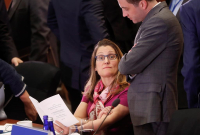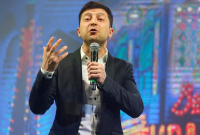Support strong Canadian climate journalism for 2025
Canadians are “very likely” to be targeted by foreign meddling in connection with the 2019 federal election, says the national electronic spy agency.
Communications Security Establishment (CSE), which monitors foreign signals intelligence and has a mandate to defend key Canadian computer networks, made the assessment in a report Monday on cyber threats to democratic processes.
The assessment comes on the heels of a similar statement by Foreign Affairs Minister Chrystia Freeland, who said Friday at a G7 meeting in France that malign foreign actors will likely meddle in the election, in order to "make our societies more polarized and to make us, as citizens of democracies, more cynical about the very idea that democracy exists and that it can work."
It also comes two months after Australian Prime Minister Scott Morrison revealed that the country's Parliament and its major political parties had been targeted by a “sophisticated state actor" that left agencies there initially unsure about what material had been taken.
Speaking to media after the report's release, Democratic Institutions Minister Karina Gould said she didn't think social media platforms were taking the situation seriously enough.
“I don’t have the confidence that they are disclosing everything with us, and I think from experiences we’ve seen around the world that there is a lot left to be desired in terms of how seriously they’re taking these issues," she said.
The April 8 document from CSE is an update to its 2017 report. Since that publication, it noted on Monday, there have been continuing cyber attacks against voters, political parties, candidates, and staff.
It said "political parties, candidates, and their staff remain attractive targets” and make up a tenth of cyber threat activity against democratic processes in Organisation for Economic Co-operation and Development (OECD) countries.
Half of all OCED countries that held national elections in 2018 “had their democratic process targeted by cyber threat activity,” CSE said.
Based on classified and unclassified intelligence, the agency said it had concluded in the 80-per-cent-confidence range that “Canadian voters will encounter some form of foreign cyber interference related to the 2019 federal election."
This is the same level of probability that the agency had used in an earlier 2018 report, called the national cyber threat assessment. However, that report did not specify that the cyber activity would be specifically associated with the upcoming federal election.
Gould said she anticipated that "nefarious cyber activity targeting voters, elections infrastructure and Canada’s politicians and political parties may be more sophisticated, more coordinated and more determined" than ever.
"We will not accept malicious activity during our elections and we are prepared to confront it," said the minister.

Report shows 'shift' began after 2016 U.S. election
The report is designed to give Canadians tools to be more critical of sources of information, said Gould. For example, it warns against deep fakes, or videos produced to mimic real footage, such as a politician giving a speech that she never gave.
CSE also discusses how cyber actors may "steal information and then release it to the public for the purpose of embarrassing or discrediting the political party or candidate," and that the information may be modified before being released.
U.S. Special Counsel Robert Mueller’s office said this year that hackers in Russia stole evidence connected with their investigation and then altered it before releasing the documents, as part of a disinformation campaign.
Other allies like France have dealt with computer hacks, like President Emmanuel Macron’s campaign emails, and attempts to influence the outcome of electinos.
CSE said Monday that "a foreign adversary has manipulated information on social media to amplify and promote viewpoints highly critical of government of Canada legislation."
Russia protested Canada's decision to impose sanctions and ban travel of foreign officials accused of human rights violations. Recently a Russian documentary suggested Ukrainians "dictate Canadian foreign policy," CBC News reported.
But CSE does not specifically spell out Russia as a malign actor in the 2019 election. Defence Minister Harjit Sajjan said the full range of threats should be given equal prominence.
"I would say what today is about is making sure that we give Canadians the confidence and demonstrate the system we have in place, that we’re casting a very wide net, and make sure we don’t narrow in on anything," he said.
CSE also said it was “improbable” that election interference in Canada would occur on the scale of the Russian activity that occurred during the 2016 United States presidential election.
“Even if a foreign adversary does develop strategic intent to interfere with Canada’s democratic process, we consider foreign cyber interference of the scale of Russian activity against the 2016 U.S. presidential election improbable at this time in Canada in 2019," it said.
"However, we judge it is very likely that Canadian voters will encounter some form of foreign cyber interference ahead of, and during, the 2019 federal election.”
Russia launched daily cyber attacks against Ukraine’s critical infrastructure and election systems during its recent election campaign, the Ukrainian ambassador to Canada told the Canadian Press.
Ukraine, which had its Crimea region annexed by Russia in 2014, is also still dealing with Russian-backed rebels in the Donbass in the country’s east, the news outlet reported.
The agency says there was an acceleration of cyber activity against democratic processes that “seems to have started in 2016,” and now accounts for a majority of this activity, “due in part” to the success of Russia’s interference in the 2016 election.
It also said Russia’s Internet Research Agency (IRA), which was named by Mueller in several of his charges, "continues to create illegitimate websites to host false and misleading information framed as independent online journalism or personal blogs."
IRA botnets help spread and promote this information, it said, across various social media platforms, where it "ends up in the feeds of genuine users, most of whom are likely unaware of its malicious origin and deceptive intent."
No 'confidence' platforms are disclosing: Gould
As with the IRA botnet example, social media platforms like Twitter, Facebook, YouTube, Instagram and others are a key vehicle that cyber actors can use to spread false or misleading information.
On Twitter, "more than one foreign adversary" has spread false info relating to Canada, CSE stated in its report.
The Trudeau government has announced a series of measures about safeguarding the fall federal election, including the Critical Election Incident Public Protocol, which allows the national security agencies to brief a panel of top officials on threats, and inform the prime minister, party officials and Elections Canada.
However, the Canadian government has declined to slap new regulations or laws on social media platforms, preferring instead to negotiate with them, so they voluntarily put in place new rules to enhance their transparency.
Gould said Monday that “we have not really seen that much progress" on that front.
"I haven’t seen a willingness or keenness to respond actively here in Canada. I think that’s disappointing because I think Canadians deserve more than that."
In September, the European Union established a "self-regulatory Code of Practice" to address online disinformation. Gould said she has been talking with the platforms about adding Canadian content when they implement steps to address the EU code.
But she felt the platforms had made it clear they were already doing all they could, and that further efforts would require a large amount of resources. In some cases, she said, the market in Canada was just not seen as big enough to be worth the effort.
The government's election bill, C-76, which passed in December requires platforms to keep a registry of political and partisan ads. Facebook has unveiled a suite of tools to capture information about political ads, although Google said it would simply ban them because it would be too difficult to comply.
The minister said Monday that Twitter had not indicated yet if it was similarly going to ban ads.
Colin McKay, head of government policy at Google Canada, said in a statement that Google was committed to combating misinformation and working with the Canadian government to fight cyber threats.
"We have met several times with the minister of democratic institutions and her staff, Elections Canada, the commissioner of elections and the Privy Council Office to discuss our plans on transparency, cybersecurity and information," said McKay. "We have every intention of continuing our close work with government to protect Canada’s democratic institutions and election activities."
Google published a white paper on how the company says it is fighting misinformation across its search, news, and advertising products as well as YouTube, and launched a news literacy program with the Canadian Journalism Foundation and Civix. The company also says it is working with the CSE's Centre for Cyber Security to prepare for the election.
Meanwhile Facebook, which has faced intense criticism over how its platform was used by Russian actors in the 2016 election, has also been dealing with accusations it is been too soft on hate-based organizations. Last month, the organization moved to ban white nationalism from its platform.
On Monday, the platform said it had started implementing this new policy, kicking off a series of "individuals and organizations who spread hate, attack, or call for the exclusion of others on the basis of who they are."
The company said this included Faith Goldy, Soldiers of Odin and hate groups like the Canadian Nationalist Front, Aryan Strikeforce, Wolves of Odin and white power activist Kevin Goudreau.
Editor's note: This story was updated at 1:20 p.m. ET on April 8, 2019 to add additional information from Gould's press conference. It was updated again at 1:13 p.m. ET on April 9, 2019 to add a statement from Google.






Comments
Liberals planting seeds of doubt?
If anyone hacks our elections, it would most likely be the United States.